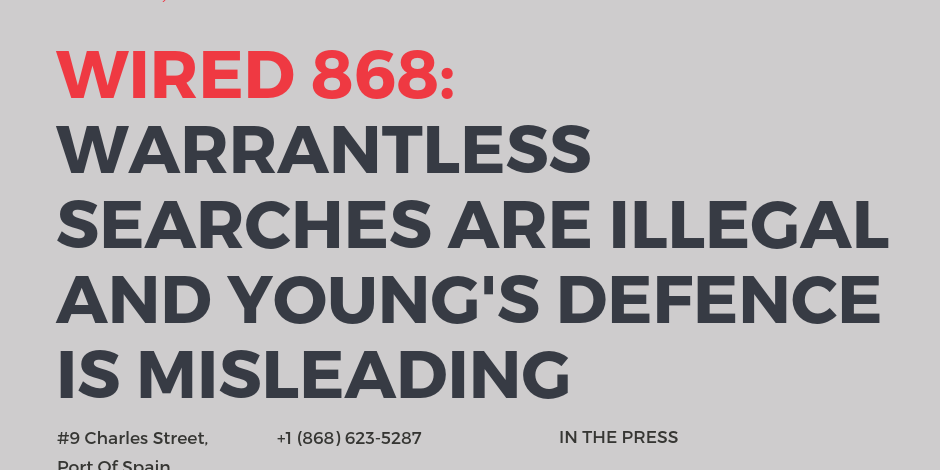“In the context [of the police searches of homes in the Gulf View area, National Security Minister Stuart Young’s] words are, with respect, equivocal and misleading…”
The following Letter to the Editor on recent warrantless searches by the Police Service was submitted to Wired868 by attorneys, Dr Emir Crowne, Matthew Gayle, Crystal Paul, Jason Jones:

(Copyright TTPS)
A warrantless search of one’s home is illegal. Such searches are prima facie unreasonable, lack legal authority and breach the constitutional right ‘of the individual to life, liberty, security of the person and enjoyment of property and the right not to be deprived thereof except by due process of law’ (ss. 4 (a)) and ‘the right of the individual to respect for his private and family life.’ (ss. 4 (c)).
That the State defends the legality of such searches is troubling.
For instance the Minister of National Security, the Honourable Stuart Young, is quoted as saying that: “… if you are a law enforcement officer doing your duty and there is reasonable suspicion to believe that a crime is being committed, is about to be committed or is in the process of being committed, they have the authority to enter premises and to do what needs to be done to investigate that and prevent it.”
On its own the statement may be true. However, Minister Young was speaking with specific reference to the searches of several homes in the Gulf View area. In that context his words are, with respect, equivocal and misleading.
Section 46 of the Police Service Act sets out the grounds for effecting a warrantless arrest.
The statutory grounds largely codify the common law powers of the police, and others, to enter a home to effect an arrest. Namely: (1) to prevent a murder; (2) to arrest a felon who has been followed into the house; (3) to prevent the commission of a felony; and (4) the right of the police to follow an offender running away from them (Dana Seetahal, Commonwealth Caribbean Criminal Practice and Procedure, 4th ed, Routledge 2014 at p 38 (citing Swales v Cox, [1981] 1 All ER 1115)). As Seetahal notes, the first three common law powers of entry are enjoyed by citizens generally.

(Courtesy New City Chambers)
There are, however, no comparable grounds under the Police Service Act for the warrantless search of premises per se.
Similarly, section 16 of the Anti-Gang Act appears to authorise warrantless searches, but it too is of no assistance to the State. Sub-section 16 (3) of that Act provides that:
“A police officer may enter without a warrant and search a place or premises not used as a dwelling house including a building, ship, vessel, carriage, box or receptacle, if he has reasonable cause to believe that a gang leader, gang member or a person whom he has reasonable cause to believe has committed an offence under this Act may be found in that place or premises.” (emphasis added)
The authority to conduct a warrantless search under the Anti-Gang Act therefore expressly excludes private homes.
Aside from the common law powers of entry identified above (none of which are applicable to the present situation), the common law jealously guards against any State intrusion into our homes. The starting point for the inviolability of one’s home is Semayne’s Case, [1604] All ER Rep 62, where Sir Edward Cooke famously stated that ‘the house of every one is to him as his castle and fortress, as well for his defence against injury and violence as for his repose’ (see further, Entick v Carrington, [1765] EWHC KB J98).
The common law power of search incident to arrest and the common law power of search incident to lawful investigative detention are also not applicable to the present situation, since the searches themselves were the dominant activity and not ‘incidental.’

(Copyright TTPS)
Similarly, the common law power to search in exigent circumstances is also inapplicable as there was no ‘imminent danger of the loss, removal, destruction or disappearance of the evidence if the search or seizure [was] delayed’ nor any apparent threat to police safety (see generally, R v Paterson, 2017 SCC 15 at paras 32-33).
In sum, warrantless searches of private homes cannot continue. They are illegal and a dangerous intrusion into our constitutionally protected rights. To defend such searches is both irresponsible and troubling. Homeowners would be entirely within their right to refuse such search requests without a valid warrant.






